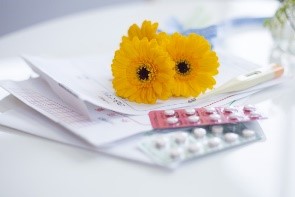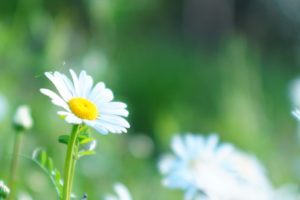Hana Therapists in the limelight!
~ Meet our Hana Therapists ~
Many Hana Therapists have achieved their dreams by qualifying as Hana Therapists. Here are some examples of Hana Therapists in action and their passion for their respective fields.
Education
Hana Therapist Instructor
Kazumi Morishima
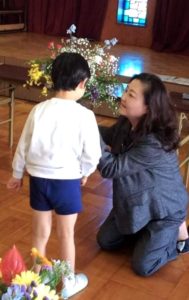
‘I pass on my appreciation for life to children.’
Since becoming a Hana Therapist instructor 11 years ago, I have trained Hana Therapists and given classes on flower education and Hana Therapy, a project promoted by the Ministry of Agriculture, Forestry and Fisheries, at kindergartens, nursery schools, children’s schools, elementary, junior high and high schools in Osaka and Kyoto. We support people who have become Hana Therapists to work as assistants in flower education and Hana Therapist. They can deepen their awareness and learning by actually engaging with pupils. Furthermore, they can take part in various events. We are there to help you make the most of these experiences to improve your skills. What I think is important about the role of a Hana Therapist is to make children smile. I have realised this from children at flower education and Hana Therapy sessions. The coronavirus (COVID-19) disaster has made life difficult in the past two years. It has also changed the children’s flower arrangements, and I could see a sense of stagnation. We, the Hana Therapists, continued to provide opportunities to interact with flowers to the best of our ability while taking adequate measures against infectious diseases. We continued to be involved in the children’s Hana Therapy, to be part of each story that emerged in their Hana Therapy. The children’s smiles and energy gradually grew, even during the coronavirus (COVID-19) disaster. Furthermore, when the children brought home Hana Therapy arrangements, this led to communication with their parents. The flowers brought smiles to the children’s faces one after another. I believe that Hana Therapy is a way of learning to pass life on to the next generation. Hana Therapy uses fresh flowers. So children can watch them bloom and wither from the bud and realise how much they appreciate life. Specifically, we use Hana Therapy to arrange floral offerings at the Prayer and Oath Gathering held annually at Ikeda Elementary School, attached to Osaka University of Education. It is an important day to feel deeply about the preciousness of life. Finally, the most important thing for a Hana Therapist is to enjoy themselves and smile. I am also a counsellor, so when I see people changing and smiling with Hana Therapy, I realise the increasingly needed role of Hana Therapists in the coming times. I will continue to spread Hana Therapy with a smile.
Since becoming a Hana Therapist instructor 11 years ago, I have trained Hana Therapists and given classes on flower education and Hana Therapy, a project promoted by the Ministry of Agriculture, Forestry and Fisheries, at kindergartens, nursery schools, children’s schools, elementary, junior high and high schools in Osaka and Kyoto. We support people who have become Hana Therapists to work as assistants in flower education and Hana Therapist. They can deepen their awareness and learning by actually engaging with pupils. Furthermore, they can take part in various events. We are there to help you make the most of these experiences to improve your skills. What I think is important about the role of a Hana Therapist is to make children smile. I have realised this from children at flower education and Hana Therapy sessions. The coronavirus (COVID-19) disaster has made life difficult in the past two years. It has also changed the children’s flower arrangements, and I could see a sense of stagnation. We, the Hana Therapists, continued to provide opportunities to interact with flowers to the best of our ability while taking adequate measures against infectious diseases. We continued to be involved in the children’s Hana Therapy, to be part of each story that emerged in their Hana Therapy. The children’s smiles and energy gradually grew, even during the coronavirus (COVID-19) disaster. Furthermore, when the children brought home Hana Therapy arrangements, this led to communication with their parents. The flowers brought smiles to the children’s faces one after another. I believe that Hana Therapy is a way of learning to pass life on to the next generation. Hana Therapy uses fresh flowers. So children can watch them bloom and wither from the bud and realise how much they appreciate life. Specifically, we use Hana Therapy to arrange floral offerings at the Prayer and Oath Gathering held annually at Ikeda Elementary School, attached to Osaka University of Education. It is an important day to feel deeply about the preciousness of life. Finally, the most important thing for a Hana Therapist is to enjoy themselves and smile. I am also a counsellor, so when I see people changing and smiling with Hana Therapy, I realise the increasingly needed role of Hana Therapists in the coming times. I will continue to spread Hana Therapy with a smile.
Medical and welfare
Starting and opening a business
Hana Therapist Instructor
Kayo Saito
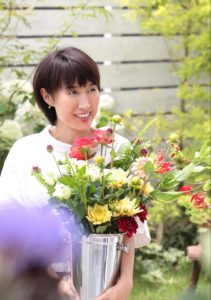
‘My unique florist shop only came about because I became a Hana Therapist.’
When I used to work for an established local florist, I often did not have time to fulfil each order carefully. I wasn’t always able to arrange flowers as a Hana Therapist. I was also worried that I always needed to stock up and dispose of many flowers. In the ‘flower shop without a shop’ that I opened, it stocks up on the necessary floral materials after a booking. As well as taking regular orders for bouquets and arrangements, the company also makes scheduled deliveries to businesses and restaurants and ‘flower subscriptions’ directly to private customers. However, my goal is not just to arrange and deliver flowers. I want to provide a life scene with flowers and give colour to ordinary lives. That is my unchanging intention.
I am happy to be a Hana Therapist.
I qualified while working as a florist, but if I hadn’t become a Hana Therapist, I would never have thought of running my own florist. There are numerous florists in the world. But my own florist is possible because I am a Hana Therapist. Carefully arranging flowers while staying close to the person fills my heart, and thinking about harmony while receiving messages from the various flowers enriches my heart. Hana Therapist offer floral suggestions based on generalisations and possibilities ands help with flower-giving and self-healing. But each person feels and notices things differently. There is a unique Hana Therapy for each person, and I can see that the possibilities are infinite, even in unintended places.
When I used to work for an established local florist, I often did not have time to fulfil each order carefully. I wasn’t always able to arrange flowers as a Hana Therapist. I was also worried that I always needed to stock up and dispose of many flowers. In the ‘flower shop without a shop’ that I opened, it stocks up on the necessary floral materials after a booking. As well as taking regular orders for bouquets and arrangements, the company also makes scheduled deliveries to businesses and restaurants and ‘flower subscriptions’ directly to private customers. However, my goal is not just to arrange and deliver flowers. I want to provide a life scene with flowers and give colour to ordinary lives. That is my unchanging intention.
I am happy to be a Hana Therapist.
I qualified while working as a florist, but if I hadn’t become a Hana Therapist, I would never have thought of running my own florist. There are numerous florists in the world. But my own florist is possible because I am a Hana Therapist. Carefully arranging flowers while staying close to the person fills my heart, and thinking about harmony while receiving messages from the various flowers enriches my heart. Hana Therapist offer floral suggestions based on generalisations and possibilities ands help with flower-giving and self-healing. But each person feels and notices things differently. There is a unique Hana Therapy for each person, and I can see that the possibilities are infinite, even in unintended places.
Hana Therapist Instructor
Mayumi Honda
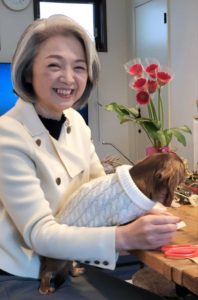
‘ Sharing joy led to works ‘ I started to receive job offers when I told my clients about the joy of getting certified as a Hana Therapist instructor and my experience of being healed by flowers. After talking enjoyment of experiencing Hana Therapy with all five senses, the healing sensations and the surprise of discovering a new you, we received a happy request to organise a Hana Therapy session. Since then, we have held workshops every three to four months, and the Hana Therapy circle has expanded with the participation of other business partners. Participants were amazed at how refreshing it was and how flowers can tell such things, and some were impressed and tears. At this moment, it is hard to organise courses for people to get together due to the coronavirus (COVID-19) disaster. However, the Hana Therapy connection continues, with orders for Hana Therapy arrangements. Because of this, I now also teach Hana Therapy at a culture club.
‘ I’m glad I became a Hana Therapist. ‘
I was a former nurse and was actively learning about mental health care. I believe that good mental and physical health is a condition for enjoying life. I find it rewarding and worthwhile to be able to provide mental care through flowers. I am grateful to have Hana Therapy as a tool to make myself useful and for myself. A person who has been attending monthly Hana Therapy sessions for a year and a half has requested to continue after the coronavirus (COVID-19) disaster. We have also received requests to continue every six months for individual sessions for the new qualification, Flower Care Consultant (stress check and flower therapy experience). I am delighted with these requests and will continue to improve myself. I appreciate connecting with people, both in real life and remotely. I will continue to grow and develop my skills further.
‘ I’m glad I became a Hana Therapist. ‘
I was a former nurse and was actively learning about mental health care. I believe that good mental and physical health is a condition for enjoying life. I find it rewarding and worthwhile to be able to provide mental care through flowers. I am grateful to have Hana Therapy as a tool to make myself useful and for myself. A person who has been attending monthly Hana Therapy sessions for a year and a half has requested to continue after the coronavirus (COVID-19) disaster. We have also received requests to continue every six months for individual sessions for the new qualification, Flower Care Consultant (stress check and flower therapy experience). I am delighted with these requests and will continue to improve myself. I appreciate connecting with people, both in real life and remotely. I will continue to grow and develop my skills further.
Self-growth
Hana Therapist Instructor
Mika Nogami
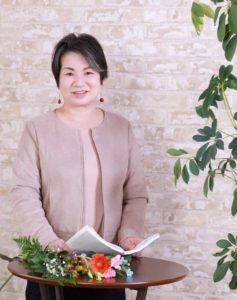
‘At the beginning of my studies, I didn’t think I would become a Hana Therapist.’
I had studied ikebana for a long time and felt that flowers had some power. However, I did not think I had the talent to arrange flowers well, so I took a Hana Therapist course to help me heal myself. As a matter of fact, in the beginning, I didn’t think much of being a Hana Therapist instructor. Hana Therapy gave me hope when I had no confidence in flower arranging. They taught me that the important thing is not to make flowers well but to make flowers from the heart and that everyone is unique and everyone is different. What’s more, to my surprise, I was able to teach a lot of people in the Hana Therapist course, even though I had no teaching experience whatsoever! I am very grateful for the opportunity to grow as a teacher and emotionally by offering Hana Therapy sessions in schools, major corporations and juvenile detention centres. The joys and pleasures of being a Hana Therapist are when people come to therapy with a gloomy face after an experience and say, “I am ________ (positive word) after all!” The fuzziness of the mind clears up, and the expression on the face becomes more vibrant. I enjoy being able to share in the joy of people’s positive mental attitude through flowers. I am happy to be a fHana Therapist who can help people accept their hearts as they are. I will keep making lots of time for Hana Therapy!
I had studied ikebana for a long time and felt that flowers had some power. However, I did not think I had the talent to arrange flowers well, so I took a Hana Therapist course to help me heal myself. As a matter of fact, in the beginning, I didn’t think much of being a Hana Therapist instructor. Hana Therapy gave me hope when I had no confidence in flower arranging. They taught me that the important thing is not to make flowers well but to make flowers from the heart and that everyone is unique and everyone is different. What’s more, to my surprise, I was able to teach a lot of people in the Hana Therapist course, even though I had no teaching experience whatsoever! I am very grateful for the opportunity to grow as a teacher and emotionally by offering Hana Therapy sessions in schools, major corporations and juvenile detention centres. The joys and pleasures of being a Hana Therapist are when people come to therapy with a gloomy face after an experience and say, “I am ________ (positive word) after all!” The fuzziness of the mind clears up, and the expression on the face becomes more vibrant. I enjoy being able to share in the joy of people’s positive mental attitude through flowers. I am happy to be a fHana Therapist who can help people accept their hearts as they are. I will keep making lots of time for Hana Therapy!
Hana Therapist Instructor
Noriko Kawami
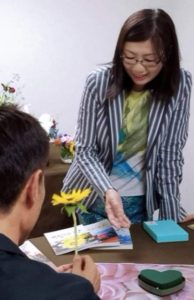
‘You don’t need floral knowledge or skills. What is important is the feeling of being close to people, the heart to see, touch and feel flowers.’
One day in 2011, these words of Chairman Aoyama led me to become a Hana Therapist, having never arranged flowers before and not knowing the names of any flowers. The comfort of being free from “must” and “should” has smoothly entered me not only when arranging flowers but also in my daily life, and I feel it has changed my life. ‘I’m what I am. That’s fine! I like the way I am!” I have come to believe that. After becoming certified as aHana Therapist instructor, I teach Hana Therapy at workshops and events and participate in certified Hana Therapist courses. One person told me a story with tears in her eyes, then looked at her flower arrangement and said, Huh? Maybe I am rather content and happy. She smiled. Another person was afraid of big, gorgeous flowers and avoided them. However, after trying several times, she put a large dahlia in the middle and smiled, “When I knew I didn’t have to work hard, it was fun.” I am happy to be there when people are healed by flowers and try to change. Being a Hana Therapist means being close to people and flowers. It is about accepting the honest feelings of oneself and others as they are. It is also about trusting and respecting others. I believe that a Hana Therapy qualification is the best way to nurture my mind for me. I am glad I learned Hana Therapy. Let’s decorate your life with flowers. The flowers shine your place, and the place shines your flowers. And your life will shine brighter in that place.
One day in 2011, these words of Chairman Aoyama led me to become a Hana Therapist, having never arranged flowers before and not knowing the names of any flowers. The comfort of being free from “must” and “should” has smoothly entered me not only when arranging flowers but also in my daily life, and I feel it has changed my life. ‘I’m what I am. That’s fine! I like the way I am!” I have come to believe that. After becoming certified as aHana Therapist instructor, I teach Hana Therapy at workshops and events and participate in certified Hana Therapist courses. One person told me a story with tears in her eyes, then looked at her flower arrangement and said, Huh? Maybe I am rather content and happy. She smiled. Another person was afraid of big, gorgeous flowers and avoided them. However, after trying several times, she put a large dahlia in the middle and smiled, “When I knew I didn’t have to work hard, it was fun.” I am happy to be there when people are healed by flowers and try to change. Being a Hana Therapist means being close to people and flowers. It is about accepting the honest feelings of oneself and others as they are. It is also about trusting and respecting others. I believe that a Hana Therapy qualification is the best way to nurture my mind for me. I am glad I learned Hana Therapy. Let’s decorate your life with flowers. The flowers shine your place, and the place shines your flowers. And your life will shine brighter in that place.
Collaboration
Global
Hana Therapist Course Master
Yumi Yoneda
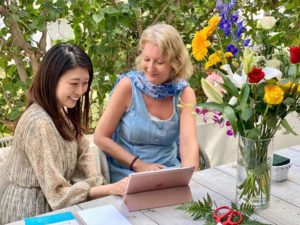
‘Everyone is different, so it’s great. That’s what I love about Hana Therapy!’
Before becoming a Hana Therapist, I worked as a flight attendant (CA) in Dubai for over ten years. I became a CA because I like people. I wanted exposure to different values and ways of thinking from all over the world, and I wanted to get to know people and do something for them.
One of the most important aspects of Hana Therapy is ‘Everyone is different.so it’s great. That is exactly what I realised from my experience of being surrounded by a diverse group of people abroad. I believe that no one person is the same in this world, and everyone is wonderful in their way. I want to help bring peace of mind to people while recognising diversity. Hana Therapy is exactly what I want to do.
In addition, having been exposed to fresh flowers through ikebana, I realised that there is a big difference between fresh flowers and artificial flowers. I was attracted to flower therapy because of its commitment to fresh flowers and its not only focus on Japan as well on the rest of the world. I will continue to help bring smiles to many people’s faces through Hana Therapy.
Before becoming a Hana Therapist, I worked as a flight attendant (CA) in Dubai for over ten years. I became a CA because I like people. I wanted exposure to different values and ways of thinking from all over the world, and I wanted to get to know people and do something for them.
One of the most important aspects of Hana Therapy is ‘Everyone is different.so it’s great. That is exactly what I realised from my experience of being surrounded by a diverse group of people abroad. I believe that no one person is the same in this world, and everyone is wonderful in their way. I want to help bring peace of mind to people while recognising diversity. Hana Therapy is exactly what I want to do.
In addition, having been exposed to fresh flowers through ikebana, I realised that there is a big difference between fresh flowers and artificial flowers. I was attracted to flower therapy because of its commitment to fresh flowers and its not only focus on Japan as well on the rest of the world. I will continue to help bring smiles to many people’s faces through Hana Therapy.


